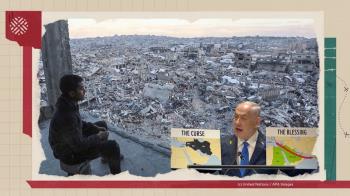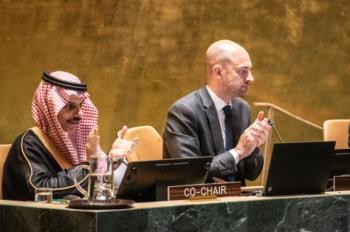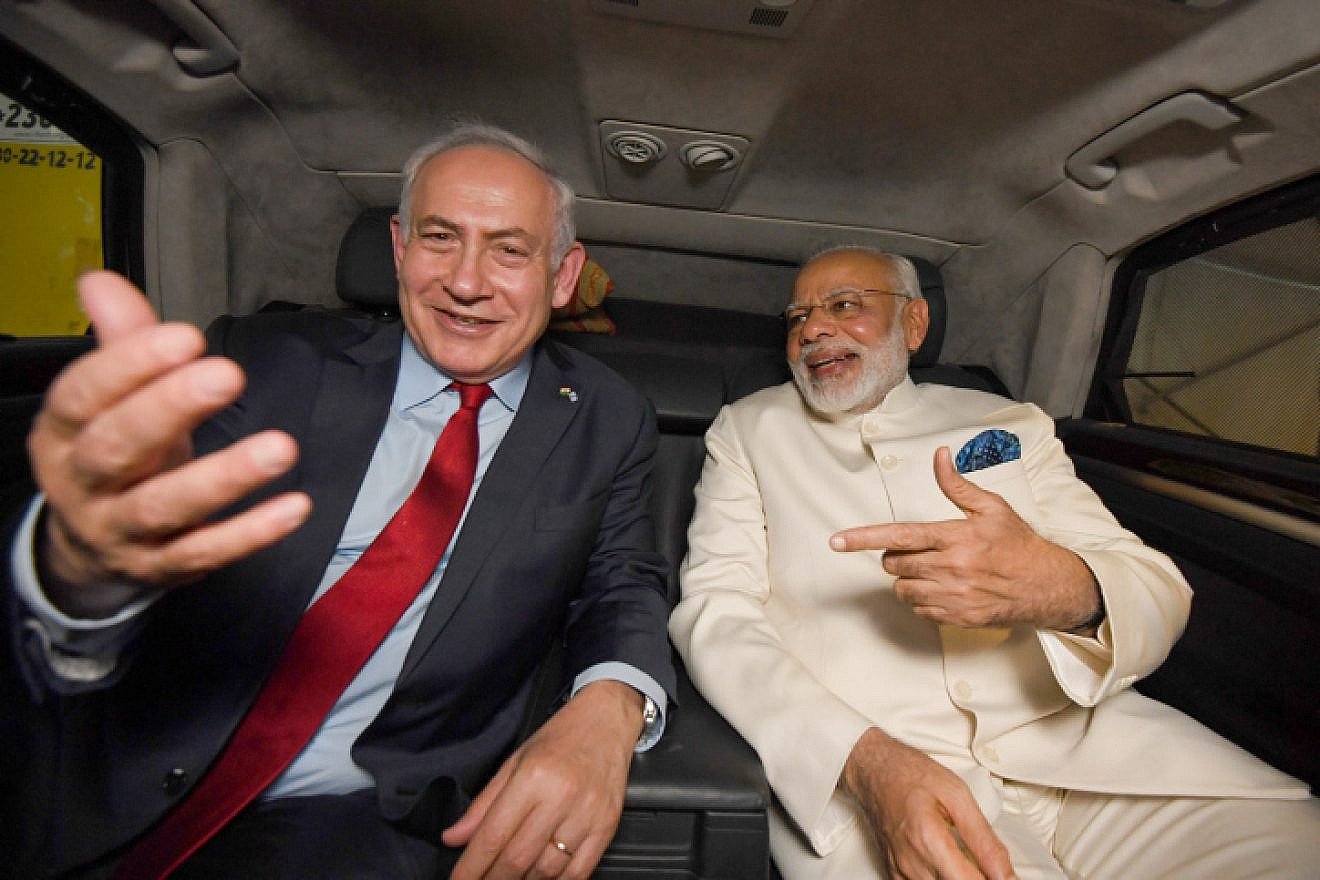Alwaght- Today, Israeli regime is living one of the darkest periods of its 8-decade history. Two years of a devastating war on Gaza that have led to death of tens of thousands of civilians, apartheid policies in the West Bank, and ongoing settlement constructions have subjected Tel Aviv to global criticism. Many European capitals and even traditional allies of this regime refuse to accept the visiting Netanyahu cabinet’s officials.
In such a context, the Indian move to roll out red carpet to the Israeli Finance Minister Bezalel Smotrich, a hardline minister who has had a distinguished role in the policy leading to massacre of the Palestinians, takes a special meaning. India is among the small number of countries that not only has not cut off ties with Israeli regime over its ongoing genocide in Gaza, but has also expanded them.
The New Delhi-Tel Aviv relationship, once was cautious and covert, is today open, warm, and multifaceted. They make an alliance that is not only based on military and economic interests, but also has its roots in deep ideological convergence between the Hindu ationalism ruling India and the far-right Zionism ruling the Israeli regime.
This reality raises an important question: Why has India, despite its historical support for Palestine, become Israel's closest partner in Asia today? What factors are driving this alliance, and what are its implications for the region and the international order?
From solidarity with Palestine to rolling out red carpet to Smprtrich
The history of Indian-Israeli relations is fraught with contradictions. India, emerging from its own experience as a former British colony, became one of Palestine's most vocal supporters after gaining independence in 1947. The foundational figures of the Indian state, Mahatma Gandhi and Jawaharlal Nehru, viewed Zionism through an anti-colonial lens.
India notably refused to endorse the 1947 UN Partition Plan that led to the creation of Israeli regime. Gandhi himself once asserted that “Palestine belongs to the Arabs in the same sense that England belongs to the English or France to the French."
New Delhi declined to recognize Israel until 1950 and in the next decades it actively backed the Palestinian Liberation Organization (PLO) as the laleading anti-occupation force of Palestine. Even in 1975, India endorsed a UN Security Council resolution that labeled Zionism as racism.
But the end of the Cold War and the geopolitical changes of the 1990s turned the tide. In 1999 and during Kargill War with Pakistan, Israel provided to India drone systems and laser-guided bombs pivotally enabling New Delhi actions against Islamabad.
In 1992, New Delhi established full diplomatic relations with Israel in the hope of closer ties to the US as the main backer of Israel. Their official slogan was at the time was "the road to Washington passes through Tel Aviv." As a result, their military and security partnership developed fast, and now under Prime Minister Narendra Modi, these relations have taken not only a strategic but also ideological dimension.
Security and military axis: From Barak 8 to Harop drones
India is the largest buyer of Israeli weapons. Nearly half of Israel's arms exports since 2014 have gone to India. Between 2001 and 2021, New Delhi purchased over $4.2 billion in weapons from Tel Aviv. The Barak 8 missile defense system—a joint product of Israel Aerospace Industries and India’s DRDO—now plays a major role in protecting India's airspace. Israel's Harop kamikaze drones and advanced surveillance systems have become an integral part of the Indian army's operations.
This cooperation is not merely a simple import of weapons, but rather signifies a structural integration of the two militaries. Since 2022, India has participated in the I2U2 group of four nations—India, Israel, the US, and the UAE—which aims to create a transportation corridor connecting India and Europe via Israel, Saudi Arabia, and the UAE. Recent clashes between India and Pakistan have also shown that Israeli equipment plays a decisive role in India's defense capabilities. As a result, Israel has become a critical partner for India's national security.
India's role in Israeli weaponry chain
Simultaneous with the genocidal Israeli war on Gaza and public pressure on European governments to halt arms exports to Israeli regime, India has taken on a new role of arms supplier. The discovery of missile components labeled "Made in India" among the ruins of the Nuseirat camp, or the interception of the ship Marian Danica in a Spanish port—carrying 27 tons of explosives from India bound for Haifa—demonstrate that New Delhi is now not just a buyer, but also a seller and an industrial partner to Israel.
Joint ventures like Adani-Elbit and Premier Explosives, or the state-owned Munitions India Ltd., are key links in this chain. For Tel Aviv, which is facing pressure from public opinion in the West, India has become a stable and less scrutinized partner.
Ideological bonds: Hindutva and Zionism
The Indian-Israeli closeness is not a product of business ties, rather, it also rests on ideological convergence. India's ruling party Bharatiya Janata Party (BJP), through Hindutva ideology, or Indian nationalism, is seeking to build a supremacist Hindu nation in India. This project has glaring similarities to Zionism and Israel's ethno-nationalist policies.
Under Modi, India-Israel relations have taken on a distinct ideological hue. Modi was the first Indian Prime Minister to officially visit Israel in 2017.
His party has drawn parallels between its ethno-nationalist policies and Zionism. The Zionist vision of a Jewish "homeland" in historical Palestine has served as a model for the Hindu nationalist ideology of Hindutva, which advocates for the establishment of a Hindu supremacist nation in India.
Bilateral relations reached an unprecedented level under Modi. For the Hindutva movement, Israel represents an model for a state that has successfully institutionalized occupation, marginalized minorities, and fortified its national identity against external threats
Kashmir, the Palestine of India
One of the clearest areas where India emulated Israel is the Kashmir cause. In 2019, Modi’s government revoked the region’s limited autonomy and launched a wave of non-local settlement—an approach reminiscent of Israel’s policies in the West Bank.
Indian diplomats and intellectuals have openly referred to the Israeli model. That same year, Sandeep Chakravorty, a senior Indian diplomat, suggested that Hindu migrants in Kashmir could emulate Israeli settlers in the West Bank. More recently, Indian scholar Anand Ranganathan called for an “Israel-style solution” to the Kashmir conflict.
Since 2022, authorities have granted residency permits to more than 80,000 non-local migrants, a policy echoing Israel’s expansion of settlements in Palestinian territories.
As Apoorvanand, a professor at Delhi University, puts it: “Hindutva admires Israel’s methods in Palestine as a guide for how to deal with Muslims in Kashmir.”
Following the Pahalgam attack in April, Indian forces arrested more than 2,000 people and demolished homes allegedly belonging to the families of militants who carried out the attacks.
Political economy of relations: Role of Adani group
At the center of this alliance lies the name of Gautam Adani, a billionaire close to Modi. The Adani Group has partnered with Israel's Elbit Systems to manufacture drones in Hyderabad and has also acquired a portion of the port of Haifa. These collaborations simultaneously serve the political and economic interests of both the Modi government and the Israeli defense industry. Reports indicate that drones produced by Adani have been used in attacks against Palestinians.
Public opinion and media narrative
One of the important differences of India with many countries is its extensive support to ghd Israeli regime. Polls show that over 70 percent of Indians have positive view of Israel, even higher than Americans. In Gaza war, thousands of Indian social media users have reiterated the Israeli narrative.
This shift in stance is the product of three factors:
1. A shared experience in declaring a "war on terror" and an underlying affinity for apartheid policies towards their Muslim minorities, alongside the use of territorial occupation as a military strategy.
2. Growing economic and trade relations with the Israeli regime.
3. The influence of the Hindu nationalist discourse, which promotes the Israeli regime as a model for a modern "ethnic state."
Regional and international consequences
The convergence of India and the Israeli regime carries significant ramifications for both the West and Southwest Asia. For Pakistan, New Delhi's strategic alignment with Tel Aviv translates to an heightened security threat. For Arab nations, this alliance creates a new fissure in the historical front of support for Palestine. On the global stage, India's complicity with Israel, amid Tel Aviv's growing international isolation, provides the Israeli regime with a critical source of legitimacy.
Conclusion: Evil alliance in the shadow of apartheid and nationalism
The Indian-Israeli relations these days go beyond arms cooperation. These relations rest on an evil marriage of weapons and ideology. Hindutva and Zionism are both nationalist projects that rest on discrimination against minorities and occupation. This convergence not only draws the future of Palestine and Kashmir darker but also risks establishing a model of apartheid governments in the 21st century.
At a time the world is rising against the Israeli crimes in Gaza, New Delhi by rolling out a red carpet for a hardline Israeli cabinet minister and continuing arms deals with Tel Aviv puts itself in the ranks of backers of Israeli regime. The key question is here: Does New Delhi wish to define its future with inspiration by a regime day by day sinking deeper into global isolation?



























